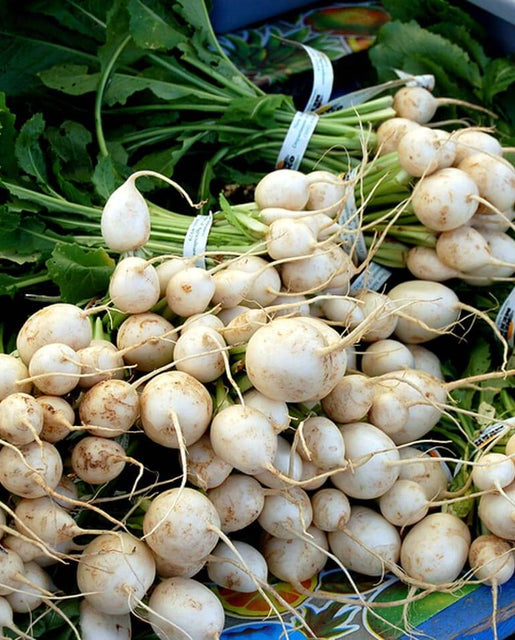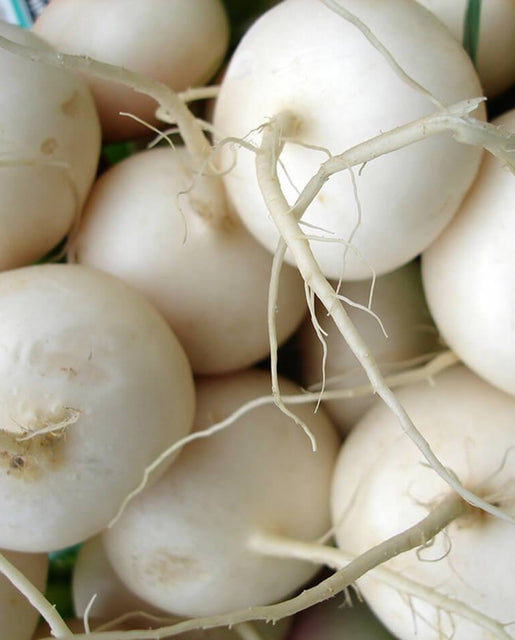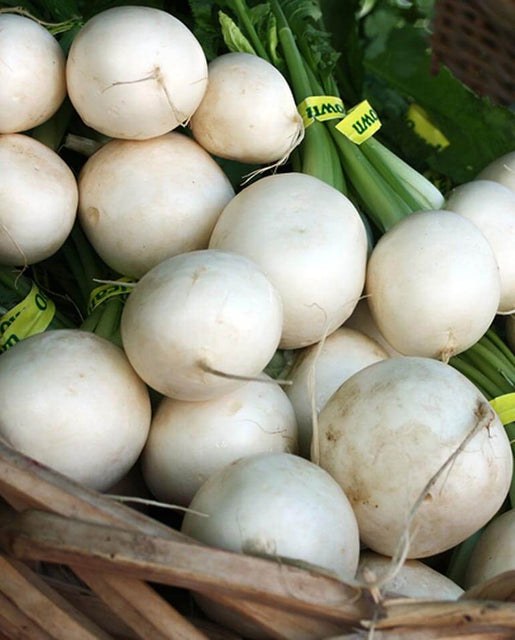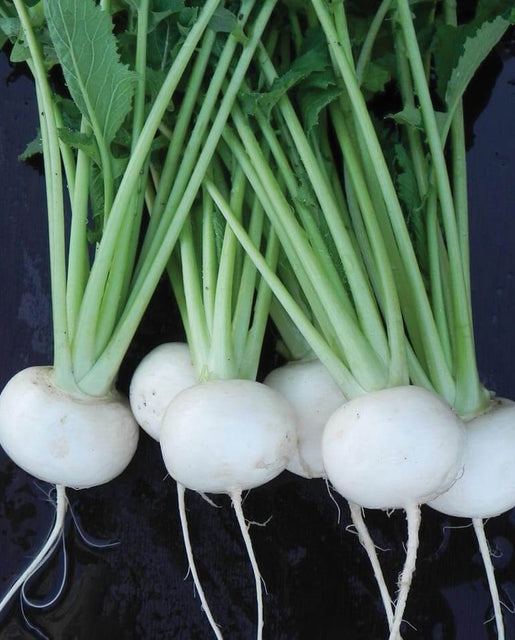For Product Registration and general enquires please contact us
Tokyo Cross
$9.99 – $179.99
This pretty little white roots are usually harvested at about 5cm (2″) for salads or steamed and eaten with butter. Or leave them in the ground to maturity – they can grow up to 15cm (6″) in diameter without becoming pithy.
Shipping & Returns
West Coast Seeds ships anywhere in North America. However, we are not able to ship garlic, potatoes, asparagus crowns, bulbs, onion sets, Mason bee cocoons, or nematodes outside of Canada. We regret, we cannot accept returns or damages for orders outside of Canada. The minimum shipping charge to the US is $9.99.
Description
More details about Tokyo Cross
This pretty little white roots are usually harvested at about 5cm (2″) for salads or steamed and eaten with butter. Or leave them in the ground to maturity – they can grow up to 15cm (6″) in diameter without becoming pithy. The flavour has just the smallest bit of “bite.” The leaves are delicious steamed like spinach. Tokyo Cross turnip seeds are quick and easy to grow. For their speed, uniformity, and flavour, This is an All America Selections winner. It’s also a winner of the RHS Award of Garden Merit.They are cold tolerant and also slow to bolt, so plant short rows from spring to fall and enjoy them over a long harvest period. Matures in 35-40 days. (Hybrid seeds)-
- Very mild flavour
- Delicious leaves
- Quick and early to grow
- Hybrid seeds
All About Tokyo Cross
Latin
Brassica rapa var. rapa
Family: Brassicaceae
Difficulty
Easy
Season:
Cool season Exposure: Full sun
Timing
Direct sow short rows starting just after the last frost date, through summer, and into the fall. Where winters are mild they can be started right into October. Optimal soil temperature for germination: 18-21°C (66-70°F). Seeds should sprout in 7-14 days.
Starting
Sow 5mm-1cm (¼-½”) deep in rows spaced 60cm (24″) apart, and thin to 15-20cm (6-8″) apart in the row.
Growing
Ideal pH: 6.0-6.8. Humus-rich, deeply cultivated soil is key. Add plenty of well rotted compost or manure to the beds and cultivate to a depth of 20cm (8″). Dig in 1 cup of complete organic fertilizer for every 3m (10′) of row. The real secret to success with turnips is speed. Sow short rows every 2-3 weeks, thin them quickly, keep them watered, harvest, and then sow some more.
Harvest
Gather greens and roots throughout summer as needed. Their immature seed pods are also tasty.
Seed Info
At least 80% of seeds will germinate in optimal conditions. Usual seed life: 4 years. Per 100′ row: 300 seeds, per acre: 87M seeds.
Diseases & Pests
Remember that turnips are members of the Brassica family, so they should not be planted where other Brassicas have been grown in the past 4 years. This simple crop rotation will prevent nearly all diseases from occurring in the first place. Floating row cover will protect plants from cabbage moth and flea beetles.
Companion Planting
Turnips are easy going, but benefit from mint and pea companions.






How to Grow Turnips

Step 1: Timing
Direct sow short rows starting just after the last frost date, through summer, and into the fall. Where winters are mild they can be started right into October. Optimal soil temperature for germination: 18-21°C (66-70°F). Seeds should sprout in 7-14 days.
Step 2: Starting
Sow 5mm-1cm (¼-½”) deep in rows spaced 60cm (24″) apart, and thin to 15-20cm (6-8″) apart in the row.
Step 3: Growing
Ideal pH: 6.0-6.8. Humus-rich, deeply cultivated soil is key. Add plenty of well rotted compost or manure to the beds and cultivate to a depth of 20cm (8″). Dig in 1 cup of complete organic fertilizer for every 3m (10′) of row. The real secret to success with turnips is speed. Sow short rows every 2-3 weeks, thin them quickly, keep them watered, harvest, and then sow some more.
Step 4: Germination
At least 80% of seeds will germinate in optimal conditions. Usual seed life: 4 years. Per 100′ row: 300 seeds, per acre: 87M seeds.
Step 5: Harvest
Gather greens and roots throughout summer as needed. Their immature seed pods are also tasty.
Tips!
Disease & Pests: Remember that turnips are members of the Brassica family, so they should not be planted where other Brassicas have been grown in the past 4 years. This simple crop rotation will prevent nearly all diseases from occurring in the first place. Floating row cover will protect plants from cabbage moth and flea beetles. Companion Planting: Turnips are easy going, but benefit from mint and pea companions.Additional information
| Matures | in 35-40 days |
|---|---|
| Season | Cool season |
| Exposure | Full-sun |
| Quantity | 1g, 5g, 25g, 100g |
You must be logged in to post a review.












Reviews
There are no reviews yet.